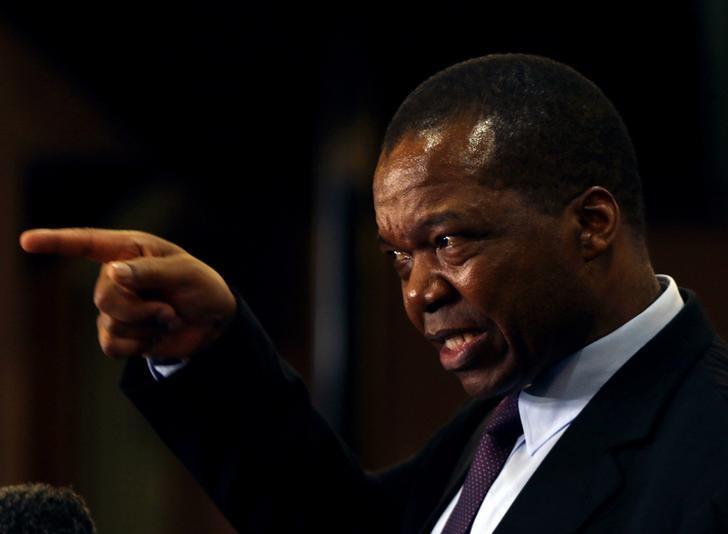Dr Mangudya talks up Mutapa, fund to stabilise economy
Reserve Bank of Zimbabwe (RBZ) Governor Dr John Mangudya who is also the chief executive officer of Mutapa Investment Fund, believes the Fund can bring long-term economic stability to the country.
Dr Mangudya, whose tenure at the central bank ends on April 30, 2024, in terms of Section 15(3) of the RBZ Act, was appointed the CEO of the Mutapa Investment Fund (MIF) by President Mnangagwa in early December last year, in terms of Section 8 (b) (1) of the Sovereign Wealth Fund Act (Chapter 22:20).
MIF was established under the Sovereign Wealth Fund of Zimbabwe Act and is owned by the Republic of Zimbabwe, as set out in Section 2 of Section 3 of the Act.
Being a sovereign wealth fund, the Fund’s objectives are to make secure investments for the benefit and enjoyment of future generations of Zimbabweans, to support the development objectives of the Government, including its long-term economic and social development, to support fiscal or macroeconomic stabilization and to contribute to the revenues of Zimbabwe from net returns on its investments.
MIF owns shareholding in 20 State-owned enterprises, including the National Railways of Zimbabwe (NRZ), NetOne and People’s Own Savings Bank (POSB), among others.
Dr Mangudya has since started work at MIF and attended the National Oil Infrastructure Company (NOIC) AGM last week Wednesday.
NOIC is one of the companies under MIF.
In an interview on the sidelines of the NOIC AGM, Dr Mangudya said MIF’s mandate is to bring long-term stability to the Zimbabwean economy.
“Mutapa Investment Fund is a sovereign wealth fund of Zimbabwe. A sovereign wealth fund, internationally and locally, in terms of best practices, is a fund that provides long-term stabilisation of an economy.
“This is where you use resources that have been invested for long-term stabilisation of the economy.”
Dr Mangudya said the mandate and vision of the Fund are to create companies that are commercially viable and create value. “So it’s creating wealth for the nation; so we are talking about commercial viability; we are talking about value creation and wealth for current and future generations,” said Dr Mangudya.
He added that the Fund will create value and wealth, which should benefit the people of Zimbabwe.
“Otherwise, it’s a generational wealth-creating company. So it’s not only for today but also for tomorrow,” said Dr Mangudya.
He gave an example of Norway’s Sovereign Wealth Fund whose assets are more than US$1,4 trillion. Closer to home, Botswana also has a similar fund with billions of Pula under it, according to Dr Mangudya.
“So we are saying that we have put the wealth here (under MIF); let’s sweat the wealth and put the money into Zimbabwe for the people of Zimbabwe to enjoy it.”
Dr Mangudya said he sees great potential in all companies enlisted under the fund including NOIC, a monopoly, being the only company that has an oil pipeline.
“So it means that like any other oil company of any nation it should make more money.”
Another one with great potential is PetroTrade that Dr Mangudya said should compete with other private-owned fuel companies such as TotalEnergies and create value. The outgoing central bank governor said the National Railways of Zimbabwe (NRZ) is a big company that needs to ensure that it provides the locomotives, the wagons and the services as opposed to its current status.
“So they have plenty of potential,” he said.
He also mentioned Cold Storage Company (CSC) which he said needs to go back to its low-hanging fruits and export.
“So all the companies under MIF have a niche market and they are all looking at the market; if we do it well, which we will do, they will turn around,” said Dr Mangudya.
To ensure transparency and ethical governance, Dr Mangudya said the Fund has put in place various committees to oversee the companies.
“What we are doing as a holding company is that we have put in committees such as an investment committee, an audit and risk committee, a governance committee and the HR committee.
“They look at the governance of each entity under Mutapa to show that there is comparability and consistency in the implementation of the policies coming from the Fund, which means you will be able to compare and contrast the rest of the group of companies under Mutapa and that is very feasible,” said Dr Mangudya.
He noted that the Government has centralised entities under one roof for the purpose of enhancing governance, enhancing performance and facilitating easy administration. In terms of capitalisation of the companies, Dr Mangudya said the Fund will look at any of those entities’ balance sheets and see where they can use the balance sheets to make money for them to capitalise going forward.
“Obviously, in the short term, they might need some bit of capital, which is funds to put it into their own operations, so they can move. And those are now one group of companies that can leverage the larger balance sheet of Mutapa to raise funds for those that are coughing, so they can also start moving well. For those that are moving well, we will ensure that we put more energy into them,” said Dr Mangudya.
He thanked President Mnangagwa for appointing him to head MIF.
“I’m there to serve, and I’m very thankful to the President, who reposed his confidence in me to run this one,” he said.—Business Weekly











